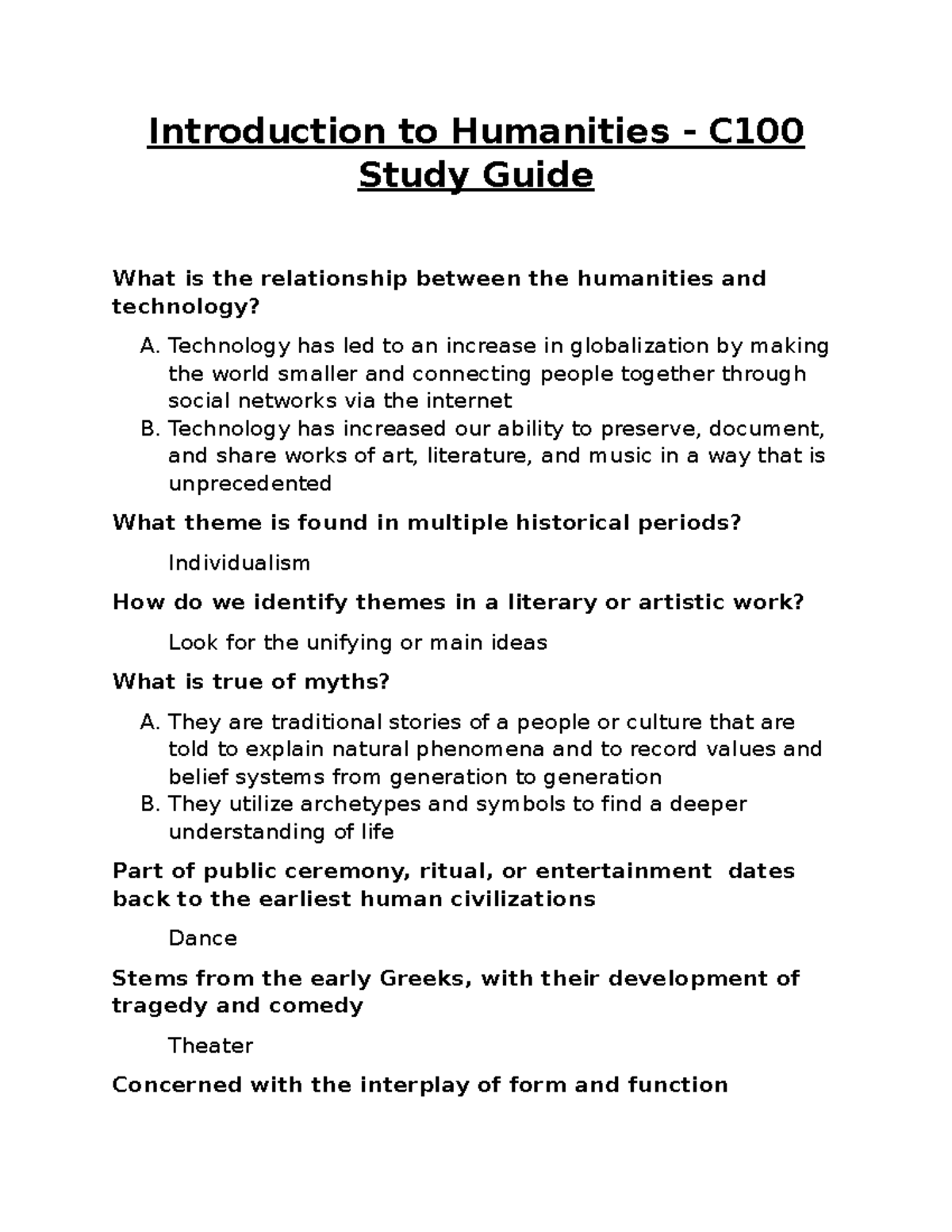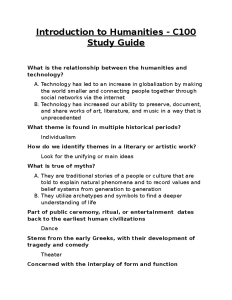Introductory humanities courses are vital for first-year college students as they provide a unique window into the world of arts and humanities. These engaging classes are crafted to inspire students, creating transformative learning experiences that ignite a passion for critical thinking and cultural exploration. With an increasing focus on humanities enrollment initiatives, universities are reimagining these courses to better engage and captivate new learners. From analyzing significant texts to understanding the intricacies of human culture, these courses lay the foundation for a deeper appreciation of our artistic and historical heritage. As students embark on their collegiate journey, embracing arts and humanities courses can enrich their educational experience and empower them to navigate a complex world.
First-year liberal arts classes serve as an essential gateway for students entering their academic journeys. Designed to stimulate curiosity and foster engagement in the various disciplines of the humanities, these introductory offerings encourage students to explore critical questions about society, identity, and creativity. As institutions develop targeted strategies to boost enrollment in these fields, they aim to provide fresh perspectives and invigorate students’ passion for the arts. By facilitating immersive learning experiences and emphasizing the importance of cultural literacy, these foundational courses promote a deeper understanding of what it means to be human. Ultimately, such initiatives seek to cultivate a vibrant community of learners who value the significance of humanities in their personal and professional lives.
The Importance of Introductory Humanities Courses
Introductory humanities courses serve as the gateway for first-year college students to explore the diverse fields of arts and humanities. These courses are designed to spark interest and foster a deeper understanding of human culture, literature, and philosophy. By engaging students in meaningful discussions and reflective practices, they lay the foundation for critical thinking and creativity. Dean Sean Kelly emphasizes the need for these courses to connect with students, allowing them to appreciate the intrinsic value of the humanities—beyond just their application to careers.
In recent years, the declining enrollment in arts and humanities programs has raised concerns across educational institutions. Many students enter college with a genuine interest in these subjects, yet a significant number shift their focus by the time they declare their majors. Introductory humanities courses must therefore address this issue head-on, by offering transformative learning experiences that resonate with students’ lives. When well-designed, these courses can provide clarity, direction, and a renewed appreciation for the arts and humanities.
Transformative Learning Experiences in the Arts and Humanities
Transformative learning experiences are central to the newly proposed introductory courses developed in the Division of Arts and Humanities. By moving away from traditional course structures, these classes aim to engage students with contemporary issues and diverse perspectives. For example, courses like “Migration and Border Crossing in Film and Photography” will explore current sociocultural dynamics, allowing students to connect history with their understanding of modern challenges. Such courses have the potential to revitalize students’ interests and encourage them to think critically about the world around them.
Furthermore, these transformative experiences help students recognize the relevance of humanities in everyday life. As they examine philosophical questions and creative expressions, students gain meaningful insights into the human experience. Courses like “Humanity, Technology, and Creation” invite young minds to ponder the impact of technology on our lives, prompting them to reflect on ethical considerations and their role within society. These learning experiences shape students into engaged citizens who value the rich contributions of arts and humanities.
Challenges in Engaging First-Year Students
One of the main challenges facing introductory humanities courses is the lingering influence of the ‘Canon Wars’ that began in the 1980s. These debates have complicated the teaching and appreciation of canonical works in literature and art, often alienating students who may not resonate with traditional texts. As Dean Sean Kelly points out, the lack of a clear definition of ‘great works’ can make it difficult for students to appreciate what the humanities offer. This highlights the need for innovative course designs that prioritize inclusivity and relevance.
Moreover, students may feel intimidated by the weight of venerable texts or concerned about their interpretative skills. To combat this, new introductory courses aim to create safe spaces for exploration and discussion, allowing students to engage with works that speak to their experiences and interests. Initiatives that emphasize interaction and critical dialogue can help dismantle these barriers, empowering students to connect with the rich tapestry of human expression in a meaningful way.
Arts and Humanities Enrollment Initiatives
The decline in enrollment in arts and humanities courses has prompted many universities to take proactive steps to attract students. These initiatives often focus on revamping introductory courses to align them with contemporary societal issues and student interests. With the introduction of nine new humanities courses at Harvard, Dean Sean Kelly aims to reverse this trend by engaging students from the start of their academic journey. Emphasizing curiosity and critical inquiry, these courses present humanities as vibrant fields of study.
Additionally, enrollment initiatives may include collaborations with high schools to boost awareness and appreciation for the arts and humanities. By engaging students earlier in their educational paths, universities can cultivate a rich pool of interested candidates ready to delve deeper into these disciplines. As these initiatives unfold, they have the potential to reshape how students view the relevance and excitement of studying the humanities, leading to more robust enrollment and sustained engagement.
Course Offerings and Faculty Engagement
The new suite of introductory courses includes a diverse range of subjects designed to pique student interest. Courses led by passionate faculty members like Karen Thornber and Richard F. Thomas aim to connect course material with engaging contemporary topics. For instance, Thornber’s “Introduction to the Medical and Health Humanities” will explore intersectionality and awareness in the context of health, fostering a greater understanding of human experiences. Faculty commitment to innovative teaching is crucial in igniting students’ passion for the humanities.
Moreover, the interdisciplinary approach taken by various instructors will allow students to see the interconnectedness of different fields within the humanities. By co-teaching courses that combine creative writing with critical analysis, instructors like Laura van den Berg and Neel Mukherjee will demonstrate how skills optimize both reading and writing. This holistic understanding enhances student learning outcomes and reinforces the idea that the humanities are not only relevant but also essential in fostering critical and imaginative thinking.
Cultural Relevance and Contemporary Issues
The introduction of contemporary issues into the curriculum is vital for keeping humanities courses relevant and engaging. Courses such as “Migration and Border Crossing in Film and Photography” will encourage students to grapple with pressing global challenges through the lens of film and literature. This not only broadens students’ perspectives but also invites them to explore the moral and ethical dimensions of current debates. Recognizing the significance of these issues ensures the courses resonate personally with the students.
Furthermore, focusing on cultural relevance enhances students’ engagement and fosters a deeper connection to course material. By taking a fresh look at literature, art, and theory in light of current events, students can better appreciate the ongoing dialogues surrounding their studies. Thus, humanities courses become not just academic pursuits but vital discussion platforms that prepare students to navigate and contribute to a complex world.
Emphasizing the Intrinsic Value of Humanities
In his vision for the introductory courses, Dean Kelly underscores the intrinsic value of the humanities beyond their practical application. He advocates for an educational experience wherein students engage not just with the mechanics of literature or philosophy, but with the core human experiences that these disciplines embody. By cultivating an appreciation for the intrinsic worth of the humanities, students are likely to develop a lifelong love for the arts.
This emphasis on intrinsic value fosters an enriched academic culture that celebrates critical thinking and creative expression. Students learn to appreciate the nuances of texts, cultivating empathy and understanding of diverse perspectives. Ultimately, by stressing the importance of what it means to be human and the significance of self-discovery through humanities studies, these courses can profoundly impact students’ lives, shaping how they think and engage with the world.
Creating a Welcoming Climate in Humanities Education
To effectively increase enrollment and engagement in the humanities, it is essential to create a welcoming and inclusive climate for new students. This means designing courses that resonate with various backgrounds and perspectives, ensuring that every student feels represented and valued. Faculty members are encouraged to incorporate a diverse range of texts and themes within their course syllabi, challenging traditional narratives and fostering a richer conversational environment.
Additionally, building strong mentorship and community engagement opportunities can bolster students’ sense of belonging within the humanities. Initiatives that promote dialogue between students and faculty, as well as collaborations with community organizations, serve to bridge the gap between academic study and real-world relevance. By cultivating an inclusive climate, institutions can encourage first-year students to embrace the humanities, leading to long-lasting appreciation and commitment to these vital fields.
Looking Ahead: The Future of Humanities Education
As these new introductory humanities courses launch, they signal a shift in how educational institutions approach arts and humanities education. By prioritizing student engagement and addressing the barriers faced by first-year students, universities can reinvigorate these disciplines, ensuring their longevity and relevance in modern academia. The hope is that these initiatives will inspire a new generation of students who appreciate the rich complexity and transformative power of the humanities.
In the coming years, continuous evaluation and adaptation of these courses will be crucial. Institutions must remain responsive to student needs and societal changes, allowing the humanities to evolve organically. By doing so, they can foster a dynamic educational experience that cultivates critical thinkers, creative problem solvers, and engaged citizens who value the profound impact of the arts and humanities on our shared human experience.
Frequently Asked Questions
What are introductory humanities courses and why are they important for first-year college students?
Introductory humanities courses are foundational classes offered to first-year college students that explore various aspects of human culture, including literature, philosophy, and arts. These courses are important because they engage students in critical thinking and fundamental questions about humanity, helping them to develop a deeper appreciation for the significance of the arts and humanities in their lives and future careers.
How do introductory humanities courses address declining enrollment in the arts and humanities?
Introductory humanities courses aim to combat declining enrollment by providing engaging and relevant learning experiences for first-year students. Initiatives, such as the introduction of nine new courses at institutions like Harvard, are designed to stimulate interest and appreciation for the humanities, thereby encouraging more students to pursue these fields beyond their first year.
What types of subjects can first-year college students expect to study in introductory humanities courses?
First-year college students can expect to study a diverse range of subjects in introductory humanities courses, including literature, philosophy, history, and cultural studies. Topics might include the analysis of significant literary works, fundamental philosophical questions, and the exploration of artistic expressions, all designed to enrich the student’s understanding of human culture.
How are introductory humanities courses being redesigned to improve student engagement?
Introductory humanities courses are being redesigned to improve engagement by focusing on contemporary issues, diverse perspectives, and interactive learning experiences. Faculty are encouraged to develop courses that resonate with students’ interests and highlight the intrinsic value of humanities, aiming to create transformative learning environments that inspire students to appreciate the relevance of these fields.
What role do transformative learning experiences play in introductory humanities courses?
Transformative learning experiences in introductory humanities courses are meant to shift students’ perspectives and deepen their understanding of human culture. These experiences often involve critical discussions, creative projects, and reflective assignments that challenge students to think deeply about their identities, values, and the world around them, forging a lasting connection to the humanities.
Can introductory humanities courses influence students’ career choices?
Yes, introductory humanities courses can significantly influence students’ career choices by equipping them with critical thinking skills, cultural awareness, and ethical reasoning. By engaging with fundamental questions of humanity, students gain insights that are applicable across a wide range of professions, ultimately enriching their career pursuits beyond traditional humanities fields.
What are the benefits of humanities enrollment initiatives for first-year students?
Humanities enrollment initiatives benefit first-year students by promoting the value of arts and humanities courses, improving access to these subjects, and fostering an inclusive academic environment. Such initiatives help students discover their passions within the humanities and encourage a more diverse range of perspectives, thereby enhancing the overall educational experience.
Why might students’ interests in arts and humanities change during their college years?
Students’ interests in arts and humanities may change during their college years due to exposure to new ideas, influential courses, and evolving personal perspectives. As students engage with introductory humanities courses that address significant cultural and philosophical topics, they may find renewed passion and drive to explore these fields further, often shifting their concentration or career aspirations in the process.
What innovative courses are being offered as part of the new introductory humanities curriculum?
The new introductory humanities curriculum includes innovative courses such as ‘Introduction to the Medical and Health Humanities,’ ‘Migration and Border Crossing in Film and Photography,’ and ‘Humanity, Technology, and Creation.’ These courses aim to attract first-year students by addressing timely themes and integrating various disciplines within the humanities, encouraging deep engagement and thought.
How do readings and texts in introductory humanities courses impact students’ understanding of the field?
Readings and texts in introductory humanities courses play a crucial role in shaping students’ understanding of the field by exposing them to significant works and diverse viewpoints. Through critical analysis and close reading, students develop their interpretative skills, allowing them to appreciate the cultural and historical contexts of the texts, which enhances their overall engagement and interest in the humanities.
| Key Points | Details |
|---|---|
| Introduction of New Courses | Nine new introductory humanities courses are launching this academic year to engage first-year students and tackle declining enrollment. |
| Why New Courses? | The initiative addresses the drop in interest among students, partly attributed to limited exposure to humanities in high schools. |
| Insight from Dean Kelly | Dean Sean Kelly aims to create courses that engage students and showcase the intrinsic value of humanities beyond mere academic requirements. |
| Successful Philosophy Model | The Department of Philosophy has successfully engaged students by moving focus from job preparation to exploring fundamental human questions. |
| Diverse Course Offerings | Courses include ‘Introduction to the Medical and Health Humanities’ and ‘Humanity, Technology, and Creation’, among others, attracting interest from a broader student body. |
| Critical Skills | Courses aim to develop essential skills like reading, critical thinking, and understanding of humanity’s core philosophical concepts. |
| The Value of Humanities | Emphasizing the importance of studying humanities, not just for practical skills but for understanding what it means to be human. |
Summary
Introductory humanities courses play a crucial role in fostering a deeper understanding of human culture and values. As educational institutions like Harvard pivot to rekindle student interest in these fields, it is essential to recognize their significance not only academically but also in shaping society. The newly introduced courses aim to provide foundational knowledge about fundamental human experiences, transforming students’ engagement with the arts and humanities in profound ways.




